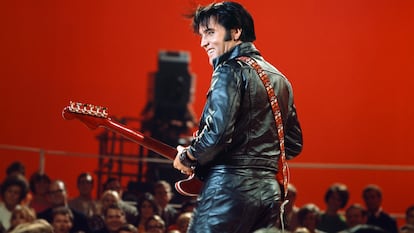The night Elvis Presley ignored Colonel Parker was one of his best
The documentary ‘Return of the King’ recounts how the singer overcame his insecurities for a glorious return to music in the ‘Comeback Special’ of 1968. And it shows how wrong the hand that handled the artist was

Elvis Presley joined the military in 1958, at the height of his career, and was posted to Germany. Dressed as a soldier, he told the camera that when he finished his service he wanted to tour Europe. He never did, and would never set foot on a stage outside the U.S. and Canada, because Colonel Parker, the manager who controled his career as he wished, had other plans. When he finished his military service, Elvis reappeared on a television show with Frank Sinatra (who denigrated rock and roll) and would hardly give any concerts, because he settled in Hollywood until he completed 30 forgettable films.
In 1968, after seven years of not performing live, Elvis wanted to be a great rocker again, instead of a mediocre actor. But he was wracked by insecurities. An agreement was made with NBC for a television special, with a live audience, to be recorded in June and broadcast in December. The Colonel planned a Christmas show, then he decided he wanted to include comedy and action numbers like those in the movies. For once, Elvis did not listen to him, but to the director of the show, Steve Binder, who gave him free rein to go through his entire repertoire and be himself. Before he began recording, he was consumed by nerves and thought he would not be able to do it. But when he stood before the audience and the cameras, dressed in black leather, insultingly handsome, a fragment of the blues number Trouble began to play and a devastating, seductive, perfect voice came out of him. An incredible 42% of that night’s U.S. television audience rediscovered the best of Elvis in the historic 1968 Comeback Special.
The story is well told in the documentary Return of the King: The Fall and Rise of Elvis Presley, which is available on Netflix. The film, directed by Jason Hehir, takes a while to narrate this milestone because it first reviews his career, without becoming a conventional biography, of which there are already many. The focus is on what Elvis wanted to do (rock, yes, but also gospel, blues, and country, the genres that had marked him as a child) as opposed to what he was forced to do by Parker, whose influence on the musician only grew after the death of his mother, Gladys. The Colonel (whose real name was Andreas Cornelis van Kuijk, a Dutchman who emigrated illegally to the United States) was determined to turn Elvis into a screen celebrity and to orient him toward all audiences, instead of exploiting his charisma and sensuality on stage, his mixed and roguish style, and one of the best voices in the history of popular music.
The singer had reason to feel insecure. It is said in the documentary that he always carried the trauma of having grown up in poverty, in the multi-ethnic and segregated city of Tupelo, before exploding as an artist in Memphis, a bustling cultural center in the south of the U.S. There was another problem: in the decade between his military service and the NBC program, the music industry had changed. The British invasion had arrived (Beatles, Stones, Kinks, Who, Animals...) as well as a glorious American batch (Dylan, Hendrix, Joplin, The Doors, Motown...). Elvis, who had been the great phenomenon of the previous decade, seemed to have been run over by the counterculture and left by the wayside. An early sign of a revival was the 1967 album How Great Thou Art, his first studio album (not a soundtrack) in five years, which featured the gospel he heard as a child in the African American churches of his hometown. He was looking forward to a new connection with the public. He doubted he could repeat the relationship he had with them. He prepared himself thoroughly, losing weight and working out to look his best.
The documentary contains testimonies from the musician’s entourage: his great friend Jerry Schilling; his widow, Priscilla Presley (she saw him live for the first time that night); the director, Steve Binder; the singer Darlene Love, who was in the chorus that night; Baz Luhrmann, who directed the controversial Elvis biopic, and an artist who could be considered one of his successors, Bruce Springsteen. They put themselves in his shoes, they imagine him preparing for the special show, his nerves. At some point, they speculate, he must have understood that he had to jump on stage: “Fuck it, I’m fucking Elvis Presley.” He was.
In addition to appearing in black leather (designed by Bill Belew), the singer dressed in an angelic white suit for the ballads and in wine red for the gospel. Various takes were recorded, and the documentary includes some discarded ones as well as rehearsals. The most exciting moment came from improvisation: Binder witnessed what Elvis did in the dressing rooms with the members of what had been his first band. This reunion deserved to be brought to the public in a format that was innovative at the time: the Sit-Down Show, an acoustic set (preceding Unplugged), with the five musicians sitting on stools in a ring and the audience around them. We see Elvis playing guitar (which was rare) with his colleagues. The complicity is evident. And Elvis appears spontaneous, relaxed, addresses the public, makes jokes. A well-rounded performance, a rebirth that had the potential to have taken him to another phase in his career.
It was a milestone, and although this story does not go any further, there were not many others. However, Elvis finally freed himself from his Hollywood commitments and devoted himself to concerts for the rest of his career. He was unable to tour Europe as he had dreamed of, but the Colonel established him permanently in Las Vegas (a city that he, in a way, transformed) and he spent the following decade there. In January 1973 he produced another great television moment: his performance of Aloha from Hawaii via satellite, which was watched, it is said, by 1.5 billion viewers in 40 countries (but in the U.S. it was broadcast on a delayed schedule in April). A shift toward extravagance, sequins, and a kitsch image was already perceptible. His voice continued to shine, but the image was that of a theme park Elvis, blending in with his new city. Obesity, addictions, and a progressive physical and artistic deterioration followed. He died in 1977 at the age of 42. Elvis was unique, and earned the title of King, but one can imagine the artistic career he would have had if at that crossroads he had chosen other paths.
Sign up for our weekly newsletter to get more English-language news coverage from EL PAÍS USA Edition
Tu suscripción se está usando en otro dispositivo
¿Quieres añadir otro usuario a tu suscripción?
Si continúas leyendo en este dispositivo, no se podrá leer en el otro.
FlechaTu suscripción se está usando en otro dispositivo y solo puedes acceder a EL PAÍS desde un dispositivo a la vez.
Si quieres compartir tu cuenta, cambia tu suscripción a la modalidad Premium, así podrás añadir otro usuario. Cada uno accederá con su propia cuenta de email, lo que os permitirá personalizar vuestra experiencia en EL PAÍS.
¿Tienes una suscripción de empresa? Accede aquí para contratar más cuentas.
En el caso de no saber quién está usando tu cuenta, te recomendamos cambiar tu contraseña aquí.
Si decides continuar compartiendo tu cuenta, este mensaje se mostrará en tu dispositivo y en el de la otra persona que está usando tu cuenta de forma indefinida, afectando a tu experiencia de lectura. Puedes consultar aquí los términos y condiciones de la suscripción digital.









































